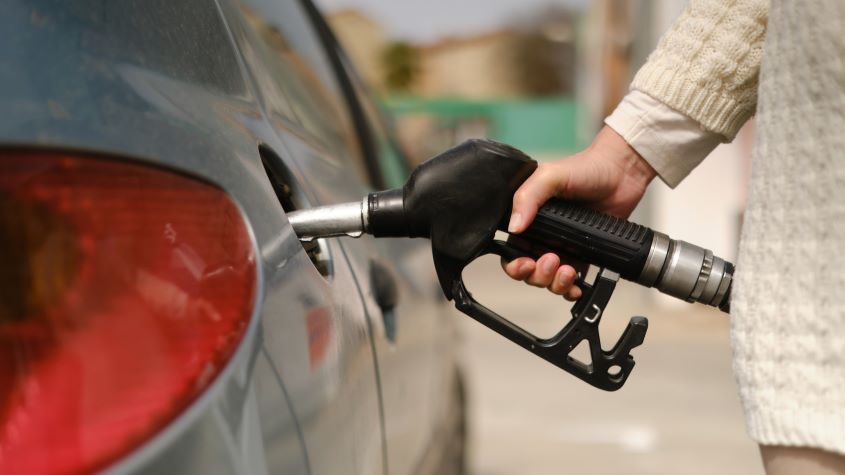Competition watchdog warns drivers still overcharged on fuel prices
The competition watchdog has revealed that motorists are still paying too much for fuel, a year after its initial investigation. How can you save on fuel costs?

John Fitzsimons

Get the latest financial news, insights and expert analysis from our award-winning MoneyWeek team, to help you understand what really matters when it comes to your finances.
You are now subscribed
Your newsletter sign-up was successful
Want to add more newsletters?

Twice daily
MoneyWeek
Get the latest financial news, insights and expert analysis from our award-winning MoneyWeek team, to help you understand what really matters when it comes to your finances.

Four times a week
Look After My Bills
Sign up to our free money-saving newsletter, filled with the latest news and expert advice to help you find the best tips and deals for managing your bills. Start saving today!
Drivers are still being ‘ripped-off’ at the pumps, overpaying by a collective £1.6 billion, the Competition and Markets Authority (CMA) said.
The watchdog started its investigation into the fuel prices market in July 2023, but says little has changed a year on, due to the lack of competition among retailers. Supermarket fuel margins - the difference between what a retailer pays for fuel and what it then sells at - are currently at around 8%, double what they were in 2019, according to the CMA.
Danni Hewson, head of financial analysis at AJ Bell says fuel prices pre-pandemic were cheaper because there was more competition among supermarkets.
MoneyWeek
Subscribe to MoneyWeek today and get your first six magazine issues absolutely FREE

Sign up to Money Morning
Don't miss the latest investment and personal finances news, market analysis, plus money-saving tips with our free twice-daily newsletter
Don't miss the latest investment and personal finances news, market analysis, plus money-saving tips with our free twice-daily newsletter
“Asda had always been the supermarket with the sharpest elbows, offering fuel at the cheapest price, forcing others to keep their offer in a similar ballpark. But the CMA has been concerned about changes in the sector since Asda was snapped up by private equity in a process that began in 2020.”
The RAC’s Simon Williams responded to the CMA’s report saying: “To see that drivers have paid £1.6bn more than they should have in the last year is nothing short of outrageous, especially when so many are dependent on their vehicles.”
“Our analysis has long shown that even accounting for retailers’ increased operating costs, margins on fuel are at extremely questionable levels.”
As it stands, the average wholesale price of unleaded petrol is 145.69p per litre – up from around 140.45p in January. Diesel costs an average of 150.93 per litre – risen from 148.28p at the start of the year, per data from the RAC.
This lack of downward movement on fuel prices is despite the CMA’s initial recommendations to help drivers save on fuel prices. One measure it mentioned was to introduce a fuel finder scheme that would let drivers see fuel prices in real-time through maps and apps. The CMA said this could save drivers £4.50 every time they use the pump.
Sarah Cardell, chief executive of the CMA, said at the time: “This will put the power in the hands of drivers who can compare fuel prices wherever they are, sparking greater competition.”
However, the scheme is still not up and running. The CMA said it would need the new government to legislate this, so it becomes mandatory for fuel retailers to share their real-time prices. There is no timescale on when this scheme could be available to the public.
In the meantime, there is a temporary price data-sharing scheme in place, which consists of 14 fuel retailers that share their prices. The retailers include the four big supermarkets, Shell, BP and Moto but the CMA warns that it still only covers “40% of fuel retail sites” and so can’t be used by real-time fuel finder apps, which have a real impact on consumer choice. You can find a full list of fuel retailers on the GOV.UK website. Retailers update their prices once a day.
Fuel prices are still contributing to high household bills – here’s how you can cut costs at the pump.
How to save on fuel prices
Spending a little time researching petrol prices in your area can help you find the cheapest fuel.
It may be convenient to fill up at the first petrol station you see on your way home, but it is a good idea to check prices as you drive by to see which are the cheapest. While supermarkets have been the most competitive historically, that may not be the case any longer, as previous RAC data shows.
You can compare prices using our sister site GoCompare, which has a useful tool to show you the cheapest spots to buy petrol and diesel in your area. You just need to enter your postcode and the type of fuel you are buying to access the best prices.
PetrolPrices.com is another site worth looking at to find the cheapest fuel in your area. Just download the app to find the best price nearby.
Make use of loyalty cards and cashback schemes
One advantage of filling your car at supermarket forecourts is the savings you can make with a supermarket loyalty card.
A number of UK supermarkets, including Tesco and Sainsbury’s, offer various cashback incentives on fuel.
The Tesco Clubcard scheme gives you one point back for every 2 litres spent on Tesco fuel. And for every 150 points earned, you are rewarded with £1.50 worth of Clubcard vouchers. The points can also be earned at Esso stations, where you can earn one point for every £3 spent if the Esso station also has a Tesco Express shop.
And Sainsbury’s Nectar card gives you one point for each litre of fuel bought at Sainsbury’s petrol stations.
Avoid ‘premium’ fuels
Using premium fuel with a higher octane rating can push up the price of your fuel bill – it can be 10p to 15p more expensive per litre compared to normal fuel. The latest Fuel Watch data from the RAC shows that the average price of a litre of super unleaded is currently 159.15p, compared with 145.69p for regular unleaded.
According to the RAC, premium fuel may be necessary for certain high-performance cars, but “in most cars any benefits are negligible”. So unless you really need it, stick to regular fuel.
Stick to the speed limit and drive more efficiently
Sticking to the speed limit isn’t just safer – it can help keep fuel costs down too, as driving at higher speeds uses more fuel.
Drive more conservatively and avoid accelerating and braking hard. The RAC’s Simon Williams says abandoning the “heavy right-foot habit” can reduce your fuel consumption.
“There is no one driving speed that is optimum for fuel economy,” he says, “but gentle acceleration and deceleration and keeping a consistent speed within the speed limit makes for fuel-efficient and safe driving."
Check your tyre pressures
Using under-inflated or over-inflated tyres can lead to higher fuel consumption, so it's important to check your tyre pressure.
You can easily check your tyre pressure either online using the TyreSafe website.
Alternatively, your car’s manual will tell you the recommended tyre pressure, and in many cars this can also be found on a plate attached to the driver’s door sill.
You can check and top up your tyre pressure at petrol stations for around 50p.
Drag, air conditioning and open windows
Choosing when to use air conditioning instead of opening the window also affects fuel economy. It is usually more efficient to open windows when driving at lower speeds compared to using air conditioning.
But using air conditioning when driving at higher speeds is usually more cost-effective as opening windows at those speeds can cause significant drag, which increases fuel consumption.
Unless it is absolutely necessary, don’t drive with roof boxes or bars attached to your car. These will significantly increase drag and lower your fuel efficiency.
Keep your car well maintained
Making sure your car is regularly maintained will reduce surprise bills in the future. A newly serviced car will typically run more efficiently and use less fuel.
As Ryan Fulthorpe, GoCompare’s motoring expert, points out, regularly servicing your car will “pay dividends when it comes to fuel consumption”.
“Change the air filter regularly, ensure your fuel cap has a good seal, and check and change the oil, as well as getting your fuel injectors cleaned,” he adds.
Get the latest financial news, insights and expert analysis from our award-winning MoneyWeek team, to help you understand what really matters when it comes to your finances.
Vaishali has a background in personal finance and a passion for helping people manage their finances. As a former staff writer for MoneyWeek, Vaishali covered the latest news, trends and insights on property, savings and ISAs.
She also has bylines for the U.S. personal finance site Kiplinger.com and Ideal Home, GoodTo, inews, The Week and the Leicester Mercury.
-
 Should you buy an active ETF?
Should you buy an active ETF?ETFs are often mischaracterised as passive products, but they can be a convenient way to add active management to your portfolio
-
 Power up your pension before 5 April – easy ways to save before the tax year end
Power up your pension before 5 April – easy ways to save before the tax year endWith the end of the tax year looming, pension savers currently have a window to review and maximise what’s going into their retirement funds – we look at how
-
 Winter Fuel Payment cut to hit ‘1.5 million’ pensioners - what support does your energy supplier offer?
Winter Fuel Payment cut to hit ‘1.5 million’ pensioners - what support does your energy supplier offer?Advice The Winter Fuel Payment is being scrapped for most pensioners this year. But you may be able to access extra support from your energy supplier. Here’s what’s on offer.
-
 Act now to bag NatWest-owned Ulster Bank's 5.2% easy access savings account
Act now to bag NatWest-owned Ulster Bank's 5.2% easy access savings accountUlster Bank is offering savers the chance to earn 5.2% on their cash savings, but you need to act fast as easy access rates are falling. We have all the details
-
 Moneybox raises market-leading cash ISA to 5%
Moneybox raises market-leading cash ISA to 5%Savings and investing app MoneyBox has boosted the rate on its cash ISA again, hiking it from 4.75% to 5% making it one of top rates. We have all the details.
-
 October NS&I Premium Bonds winners - check now to see what you won
October NS&I Premium Bonds winners - check now to see what you wonNS&I Premium Bonds holders can check now to see if they have won a prize this month. We explain how to check your premium bonds
-
 The best packaged bank accounts
The best packaged bank accountsAdvice Packaged bank accounts can offer great value with useful additional perks – but get it wrong and you could be out of pocket
-
 Bank of Baroda closes doors to UK retail banking
Bank of Baroda closes doors to UK retail bankingAfter almost 70 years of operating in the UK, one of India’s largest bank is shutting up shop in the UK retail banking market. We explain everything you need to know if you have savings or a current account with Bank of Baroda
-
 How to earn cashback on spending
How to earn cashback on spendingFrom credit cards and current accounts to cashback websites, there are plenty of ways to earn cashback on the money you spend
-
 John Lewis mulls buy now, pay later scheme
John Lewis mulls buy now, pay later schemeThe CEO of John Lewis has said the retailer will consider introducing buy now, pay later initiatives for lower-priced items.
